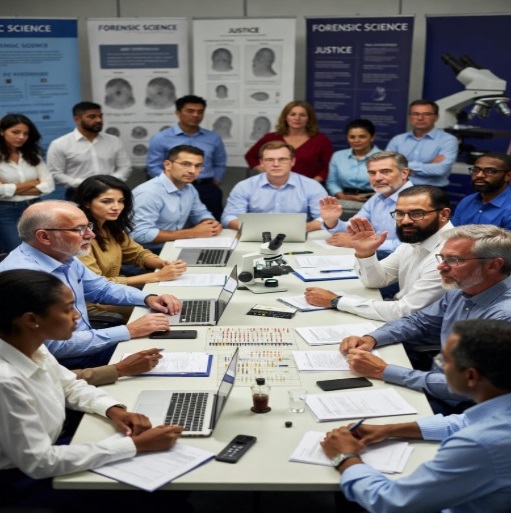(Preliminary Examination: Current Affairs)
(Main Examination, General Studies Paper 2: Issues arising from government policies and interventions for development in various sectors and their design and implementation.) |
Context
On November 10, 2025, a massive explosion occurred near the Red Fort complex in Delhi, killing at least 13 people. The role of forensic experts is crucial in such incidents, as their scientific analysis can determine whether the explosion was accidental or a premeditated crime.

Role of Forensic Experts
- Immediately after the Red Fort explosion, experts from the Explosives Department of the Delhi Forensic Laboratory arrived at the scene with the police. Their main tasks are:
- Scientifically investigating the cause of the explosion and collecting evidence.
- Identifying the type of explosive used through laboratory analysis.
- Assisting in the identification of the perpetrators.
- Explosion investigations are more complex than ordinary crimes because everything is destroyed in an instant.
- Despite this, experts work on "Locard's Principle of Exchange," which states that "every criminal leaves something at the crime scene and takes something with him."
- This scientific principle forms the basis for collecting evidence from crime scenes.
Sample Collection and Analysis Process
- Burnt debris, car parts, ashes, and other remains are collected from the scene.
- Experts then use spectroscopic and chromatographic techniques to determine which chemicals or explosives were used.
- If any electronic devices (such as timers or circuit boards) are found, it indicates that the explosion may have been remote-controlled.
Main Scientific Tests
- Fourier Transform Infrared Spectroscopy (FTIR) Attenuated Total Reflectance-FTIR (ATR-FTIR): Analysis of the reaction of samples with infrared light, which determines their chemical composition.
- Raman Spectroscopy: Used for the chemical identification of explosives.
- Scanning Electron Microscopy (SEM): Study of the microstructure of fragments left after an explosion.
- Energy Dispersive X-ray (EDX): Elemental analysis of residue.
- Thermal Analysis: Study of the stability and thermal properties of explosives.
- Laser-based Mapping and Flash Point Testing: Determining the spread, direction, and source of the fire to determine whether the explosion was an accident or a conspiracy.
Involvement of Other Forensic Branches
In such incidents, not only explosion experts but several departments work together:
- Explosives Department: Identification of explosive materials.
- Forensic Physics Division: Thermochemical examination of car engine and chassis numbers.
- Cyber Forensics: Examination of CCTV footage and digital evidence.
- DNA and Biology Division: Identification of bodies and testing of biological evidence.
Constitutional and Legal Aspects
-
Right to Scientific Investigation under the Constitution
- Article 21: The "right to life and personal liberty" is not just a right to life, but also ensures that every person has the right to justice and a fair trial. Forensic evidence, scientific investigation, and transparency are extensions of this right.
- Article 51A (g): Imposes responsibility on citizens to be aware of the environment and science. Forensic science is a practical example of this scientific approach, ensuring justice and security in society.
-
Legal Framework
- Indian Penal Code (BNS), 2023
- Sections 101(2), 226, 227, and 324(4) define offenses related to the improper use of explosive substances and causing damage to property.
- Section 103(2): The offense of murder applies to death by explosion.
- Explosive Substances Act, 1908: Regulates the manufacture, storage, and use of explosives. Forensic experts assist in the examination of chemical substances used under this Act.
- Terrorist Activities (UAPA, 1967): If an explosion is considered a terrorist activity, forensic reports play a crucial role in gathering evidence under the UAPA.
- Indian Evidence Act (1872): Under Section 45, “expert testimony” is recognized as valid evidence. Therefore, the reports of forensic experts are of crucial importance in the judicial process.
- Indian Civil Supplies Code (BNSS), 2023: Sections 329 and 330 make forensic reports and the testimony of scientific officers admissible in court.
Conclusion
Investigating complex incidents like explosions is not merely a police action, but a scientific and constitutional process. Forensic experts, balancing their technical expertise with legal obligations, not only get to the bottom of the crime but also ensure that every piece of evidence is scientifically proven in court. Thus, forensic investigation is an integral part of impartial justice under Article 21 of the Constitution, where science and justice go hand in hand.



